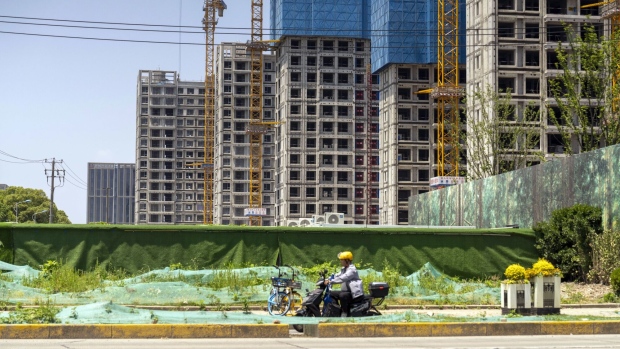May 28, 2024
Chinese Mega Cities Loosen Homebuying Rules as Aid Spreads
, Bloomberg News

(Bloomberg) -- Three of China’s biggest cities have rolled out major easing for homebuyers, as local authorities follow through on the central government’s aid for the embattled property sector.
Shanghai, Shenzhen and Guangzhou slashed downpayment requirements and allowed room for cheaper home loans in a bid to revive demand for residential properties. Analysts expect Beijing, the other tier-1 city, to do the same.
A Bloomberg gauge of Chinese developer shares rose as much as 2.4% on Wednesday morning before paring gains. It has climbed about 50% from an April low on optimism that authorities would take further steps to support the market.
Read BI reaction: Shenzhen, Guangzhou’s Drastic Property Aid May Lift Sales
Officials are trying to revive homebuyer confidence that has been crushed by falling prices, unfinished apartments and job insecurity. The latest easing comes after the government unveiled a package earlier this month to unleash 300 billion yuan ($41 billion) of funding to help local authorities buy unsold homes.
“We expect Beijing city to follow suit later,” said Jeff Zhang, a property analyst at Morningstar Inc. “We expect these combined policies will help boost property sales and the stabilization of housing prices.”
The central government recently allowed cities to reduce minimum downpayments and make their own decisions for interest rates on mortgages.
Shanghai and Shenzhen reduced downpayment requirements by 10 percentage points to a minimum of 20% for first-time buyers and 30% for second-home purchasers. Guangzhou cut the threshold by 15 percentage points to as little as 15% of the price for first-time homebuyers. Shanghai and Shenzhen lowered floors for mortgage rates, while Guangzhou removed them entirely.
Tianjin, a city neighboring Beijing with a population of 14 million, on Wednesday also lowered the downpayment ratio to a minimum of 15% and scrapped the mortgage-rate floor. The northern city of Shenyang did similar.
The measures will likely lead to a sales recovery in the next month or two, according to Zhang Hongwei, founder of Jingjian Consulting, which advises real estate companies. Still, whether the recovery will extend to the second half of the year remains unknown, he cautioned.
Reviving sentiment is a daunting challenge. There was a flurry of activity among homebuyers after the central government announced its rescue package earlier this month, but it has already begun losing steam.
In Shenzhen, which has more property investors than other cities and tends to react the most to loosening, home sales tapered off in the week ended May 26 from a week earlier, which immediately followed the rescue, according to data compiled by Midland Holdings’ realty unit. Homebuyer visits for existing properties shrank 6.9% last weekend, following an initial 127% surge the previous weekend, according to local agency Leyoujia.
New-home sales by area in tier-1 cities declined 7% in the week ended May 26 from the previous week, according to data agency Wind. Sales gained 9% and 13% in tier-2 and tier-3 cities respectively, both close to levels seen in the March busy season. Still, sales remained more than 25% below last year’s weekly average across all three city tiers.
To be sure, green shoots are emerging in the second-hand market. In Shanghai, sales of existing homes reached an average 779 units over the two weekends following the central government’s announcement, better than the weekends following two rounds of major loosening last year, according to calculations based on the official housing transaction website.
“Policymakers’ determined stance to rescue the property sector is quite obvious and local governments also turn to be more cooperative this time around,” Raymond Cheng, head of China property research at CGS International Securities HK, wrote in a note. “They may take accountability for further deterioration of their property markets.”
©2024 Bloomberg L.P.






